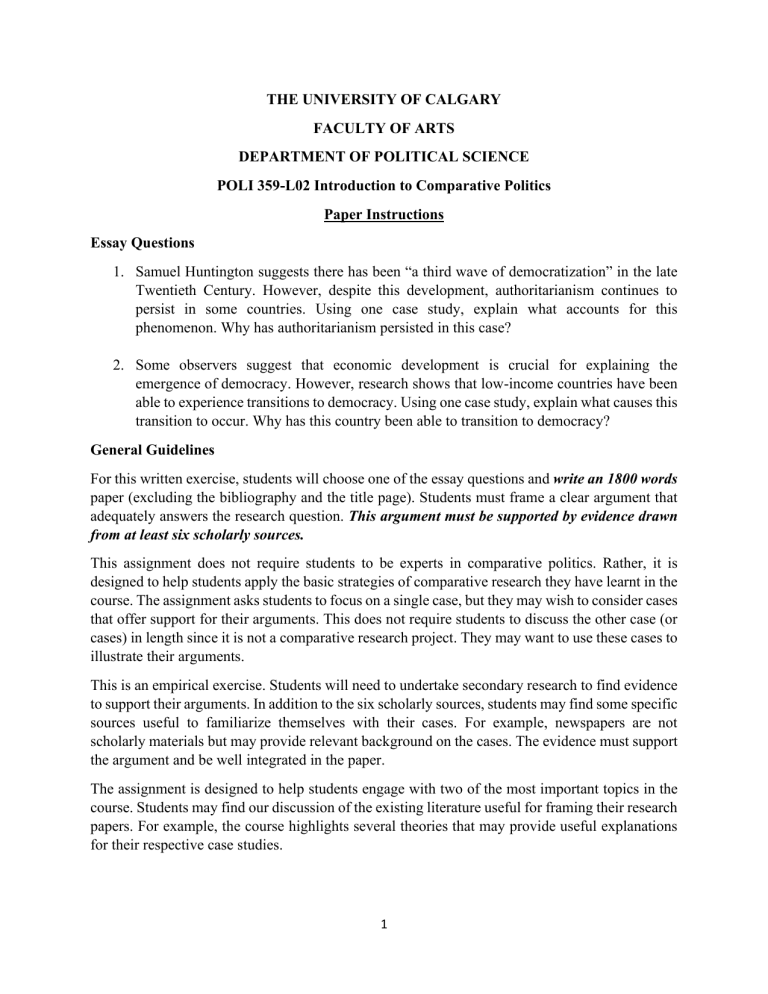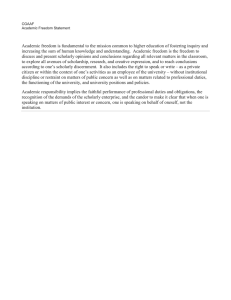Comparative Politics Essay Instructions: Democratization & Authoritarianism
advertisement

THE UNIVERSITY OF CALGARY FACULTY OF ARTS DEPARTMENT OF POLITICAL SCIENCE POLI 359-L02 Introduction to Comparative Politics Paper Instructions Essay Questions 1. Samuel Huntington suggests there has been “a third wave of democratization” in the late Twentieth Century. However, despite this development, authoritarianism continues to persist in some countries. Using one case study, explain what accounts for this phenomenon. Why has authoritarianism persisted in this case? 2. Some observers suggest that economic development is crucial for explaining the emergence of democracy. However, research shows that low-income countries have been able to experience transitions to democracy. Using one case study, explain what causes this transition to occur. Why has this country been able to transition to democracy? General Guidelines For this written exercise, students will choose one of the essay questions and write an 1800 words paper (excluding the bibliography and the title page). Students must frame a clear argument that adequately answers the research question. This argument must be supported by evidence drawn from at least six scholarly sources. This assignment does not require students to be experts in comparative politics. Rather, it is designed to help students apply the basic strategies of comparative research they have learnt in the course. The assignment asks students to focus on a single case, but they may wish to consider cases that offer support for their arguments. This does not require students to discuss the other case (or cases) in length since it is not a comparative research project. They may want to use these cases to illustrate their arguments. This is an empirical exercise. Students will need to undertake secondary research to find evidence to support their arguments. In addition to the six scholarly sources, students may find some specific sources useful to familiarize themselves with their cases. For example, newspapers are not scholarly materials but may provide relevant background on the cases. The evidence must support the argument and be well integrated in the paper. The assignment is designed to help students engage with two of the most important topics in the course. Students may find our discussion of the existing literature useful for framing their research papers. For example, the course highlights several theories that may provide useful explanations for their respective case studies. 1 As discussed at the beginning of the term, several concepts in political science are contested. Students should not assume the reader knows the meaning of the concepts they use in the paper. The concepts must be clearly defined in a way that is consistent with their arguments. The paper must include each of the components listed in the assessment (see assessment section below). The paper is due on November 19, 2019 at 11:59 pm on D2L. It is the responsibility of students to ensure papers are submitted on D2L. Unless students were granted an extension, late papers will be deducted five percent per day including weekends. After seven days, late papers will not be accepted and will be granted a grade of “zero”. Students must provide a valid justification for requesting an extension to submit the paper after the due date. Students who wish to formulate their own essay questions must receive approval from the instructor. For this type of exercise, some students may not be familiar with the cases. A list of cases for each of the essay questions is provided to help students with case selection. Students are also encouraged to seek the guidance of the instructor for issues related with case selection. Assessment: The paper must include the following: ▪ A title page, name, student Id, course name and number ▪ An Introduction: o The introductory paragraph must briefly highlight the main points that will be developed in the body of the paper. It must contain a clear thesis statement that tells the reader students’ position on the research question. ▪ A Body: o The body of the paper must clearly develop the main points that were highlighted in the introduction. The points must offer strong support for the main argument and must be drawn from at least six scholarly sources. o The analysis must clearly identify the cause of democratic transition or authoritarian persistence. ▪ Scholarly sources: o Students must properly cite and integrate all relevant materials in the paper. o Students must integrate at least six scholarly sources in the paper. Scholarly sources include peer-reviewed articles and books that offer support for the argument. Students may use non-peer-reviewed sources (e.g. newspaper article) to corroborate their claims, but these will not count towards the six scholarly materials. Some sources (Wikipedia for example) will not be accepted. The textbook may provide useful information about democracy and authoritarianism but will not be counted as part of the six scholarly sources. 2 o We ask that students use APA in-text citation style for this assignment. For a general information about APA, students may check the University of Calgary website at https://library.ucalgary.ca/c.php?g=664585&p=4671793or or Owl https://owl.english.purdue.edu/owl/resource/560/01/ ▪ The paper must be well written. Students must pay attention to the mechanics of the paper (grammar, punctuation, clarity, etc.). Students are encouraged to visit the writing centre for help. ▪ A conclusion: o The conclusion must summarise the main points and reiterate the argument of the paper. ▪ A bibliography that lists all the sources must be included in the paper. Grade scale: The following grading scale will be used: A+ (91-100) B+ (77-79) C+ (67-69) D+ (55-59) A (85-90) B (73-76) C (63-66) D (50-54) A- (80-84) B- (70-72) C- (60-62) F (0-49) *I will briefly discussion the requirements for the paper early in the term. Cases Potential Cases for Question 1 1. 2. 3. 4. 5. 6. Cuba China Saudi Arabia North Korea Mexico (between 1929-2000) Syria Potential Cases for Question 2 1. 2. 3. 4. 5. India South Africa Costa Rica Dominican Republic Ghana *Note this is a list of potential cases that may be of interest to students. Those who wish to use a different case must seek the approval of the instructor. 3


